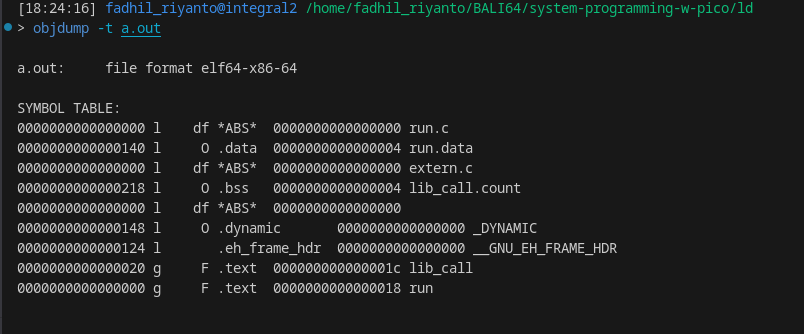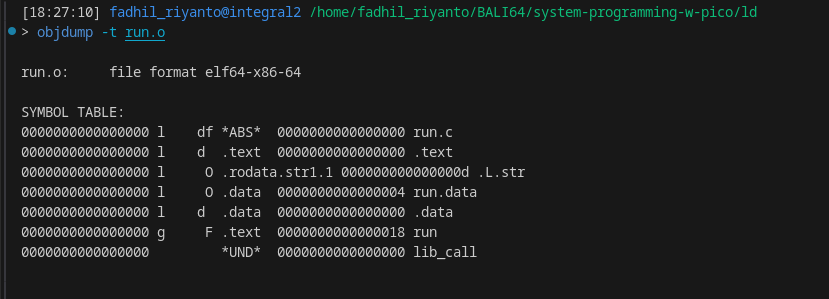GNU linker scripts 2
first, in this section I will fix all of inconsistency in ld-script.md
what is section
An object file is divided into sections containing different types of data. In the most common case, there are three sections: the text section, which holds instructions and read-only data; the data section, which holds initialized writable data; and the bss section, which holds uninitialized data. Some systems have other kinds of sections.
source: https://gcc.gnu.org/onlinedocs/gcc-8.3.0/gccint/Sections.html
my tldr is
- .data = static initialized variable
- .bss = static uninitialized variable
- .rodata = hold read only data
- .shstrtab = display all section text
- .symtab = symbol section
- .rel = relocation
Linker playground
/* extern.c */
int lib_call(const char *str) {
(void)str;
static int count;
count++;
}
/* run.c */
extern int lib_call(const char* str);
void run(void) {
/* this will be .data */
static int data = 5;
data = lib_call("im a .rodata");
}
// startfiles.S
.extern run
.global main
main:
call run
xor %eax,%eax
ret
our linker script, named link.ld
ENTRY(run)
PHDRS {
text PT_LOAD FLAGS(5); /* RX */
data PT_LOAD FLAGS(6); /* RW */
}
SECTIONS {
.text : {
*(.text);
*(.text.*)
} : text
.rodata : {
*(.rodata);
*(.rodata.*)
}
.data : {
*(.data);
*(.data.*)
}
.bss : {
*(.bss);
*(.bss.*)
}
}
compile using
clang -c extern.car rc libextern.a extern.o
we get libextern.a, which statically libraries, link it with
clang run.o -L. -lextern -nostartfiles
or optionally, let's use makefile
mk_libextern: extern.c
clang -c extern.c
ar rc libextern.a extern.o
mk_run: run.c
clang -c run.c
all: mk_libextern mk_run
clang run.o -L. -lextern -nostartfiles
all_custom_ld: mk_libextern mk_run
clang run.o -L. -lextern -nostartfiles -nostdlib -Wl,-T,link.ld -v
clean:
rm -f a.out
rm -f libextern.a
rm -f extern.o
rm -f run.o
testing time
why 0000000000000000 *UND* 0000000000000000 lib_call is undefined? because we dont link it with libextern, so linker need to do symbol resolution
here the final executable

Linker scripts are text files. https://sourceware.org/binutils/docs/ld/Script-Format.html, right. because of its text files, it has a rules
https://sourceware.org/binutils/docs/ld/Script-Format.html
there that I thing the roadmap
x86_64 playground
use this IF You want do some nice playground (that actually run'able). also

in this blog, each .text section from many *.o file, will be merged together. I'll proof it
create entrypoint
save this file as startup.S, this contain _start that will be our entry
see? its call main
// startup.S
.global _start
_start:
call main
mov $60, %rax
mov %eax, %edi
syscall
create our main
/* main.c */
int global_var = 42;
extern int lib_call(const char *str);
static inline long sys_write(int fd, const void *buf, unsigned long count) {
long ret;
__asm__ volatile("syscall"
: "=a"(ret)
: "a"(1), "D"(fd), "S"(buf), "d"(count)
: "rcx", "r11", "memory");
return ret;
}
static inline __attribute__((noreturn)) void sys_exit(int status) {
__asm__ volatile("syscall"
:
: "a"(60),
"D"(status)
: "rcx", "r11", "memory");
__builtin_unreachable();
}
int main(void) {
lib_call("a");
sys_write(1, "hey\n", 4);
while (1) {
}
return 0;
}
but where lib_call go off? let's create extern.c
the extern.o library
int lib_call(const char *str) {
(void)str;
static int count;
count++;
}
linker
then, the linker.ld (this is the our experiment)
ENTRY(_start)
SECTIONS {
. = 0x100000;
.text : {
*(.text*)
}
.rodata : {
*(.rodata*)
}
.data : {
*(.data*)
}
.bss : {
*(.bss*) *(COMMON)
}
}
makefile
mk_extern: extern.c
clang -c extern.c -o extern.o
mk_main: main.c
clang -c main.c -o main.o
mk_startup: startup.S
clang -c startup.S -o startup.o
mk_all: mk_startup mk_main mk_extern
clang -v -nostdlib -no-pie -T linker.ld startup.o main.o extern.o -o prog.elf
clean:
rm -f main.o
rm -f extern.o
rm -f prog.elf
compile with make mk_all
binary analysis
let's decompile each object file with objdump -d -s .text <filename>, and here the result
extern.c
/**
* this is objdump for extern.c
*/
fadhil_riyanto@integral2: 21:58:36 08/16/25 $ objdump -d -j .text ./extern.o
./extern.o: file format elf64-x86-64
Disassembly of section .text:
0000000000000000 <lib_call>:
0: 55 push %rbp
1: 48 89 e5 mov %rsp,%rbp
4: 48 89 7d f0 mov %rdi,-0x10(%rbp)
8: 8b 05 00 00 00 00 mov 0x0(%rip),%eax # e <lib_call+0xe>
e: 83 c0 01 add $0x1,%eax
11: 89 05 00 00 00 00 mov %eax,0x0(%rip) # 17 <lib_call+0x17>
17: 8b 45 fc mov -0x4(%rbp),%eax
1a: 5d pop %rbp
1b: c3 ret
main.c
/**
* this is objdump for main.c
*/
fadhil_riyanto@integral2: 22:22:47 08/16/25 $ objdump -d -j .text ./main.o
./main.o: file format elf64-x86-64
Disassembly of section .text:
0000000000000000 <main>:
0: 55 push %rbp
1: 48 89 e5 mov %rsp,%rbp
4: 48 83 ec 10 sub $0x10,%rsp
8: c7 45 fc 00 00 00 00 movl $0x0,-0x4(%rbp)
f: 48 8d 3d 00 00 00 00 lea 0x0(%rip),%rdi # 16 <main+0x16>
16: e8 00 00 00 00 call 1b <main+0x1b>
1b: bf 01 00 00 00 mov $0x1,%edi
20: 48 8d 35 00 00 00 00 lea 0x0(%rip),%rsi # 27 <main+0x27>
27: ba 04 00 00 00 mov $0x4,%edx
2c: e8 0f 00 00 00 call 40 <sys_write>
31: eb fe jmp 31 <main+0x31>
33: 66 66 66 66 2e 0f 1f data16 data16 data16 cs nopw 0x0(%rax,%rax,1)
3a: 84 00 00 00 00 00
0000000000000040 <sys_write>:
40: 55 push %rbp
41: 48 89 e5 mov %rsp,%rbp
44: 89 7d fc mov %edi,-0x4(%rbp)
47: 48 89 75 f0 mov %rsi,-0x10(%rbp)
4b: 48 89 55 e8 mov %rdx,-0x18(%rbp)
4f: 8b 7d fc mov -0x4(%rbp),%edi
52: 48 8b 75 f0 mov -0x10(%rbp),%rsi
56: 48 8b 55 e8 mov -0x18(%rbp),%rdx
5a: b8 01 00 00 00 mov $0x1,%eax
5f: 0f 05 syscall
61: 48 89 45 e0 mov %rax,-0x20(%rbp)
65: 48 8b 45 e0 mov -0x20(%rbp),%rax
69: 5d pop %rbp
6a: c3 ret
startup.S
/**
* this is objdump for startup.S
*/
fadhil_riyanto@integral2: 22:23:17 08/16/25 $ objdump -d -j .text ./startup.o
./startup.o: file format elf64-x86-64
Disassembly of section .text:
0000000000000000 <_start>:
0: e8 00 00 00 00 call 5 <_start+0x5>
5: 48 c7 c0 3c 00 00 00 mov $0x3c,%rax
c: 89 c7 mov %eax,%edi
e: 0f 05 syscall
overall
fadhil_riyanto@integral2: 22:25:06 08/16/25 $ objdump -d -j .text prog.elf
prog.elf: file format elf64-x86-64
Disassembly of section .text:
0000000000100000 <_start>:
100000: e8 0b 00 00 00 call 100010 <main>
100005: 48 c7 c0 3c 00 00 00 mov $0x3c,%rax
10000c: 89 c7 mov %eax,%edi
10000e: 0f 05 syscall
0000000000100010 <main>:
100010: 55 push %rbp
100011: 48 89 e5 mov %rsp,%rbp
100014: 48 83 ec 10 sub $0x10,%rsp
100018: c7 45 fc 00 00 00 00 movl $0x0,-0x4(%rbp)
10001f: 48 8d 3d 76 00 00 00 lea 0x76(%rip),%rdi # 10009c <lib_call+0x1c>
100026: e8 55 00 00 00 call 100080 <lib_call>
10002b: bf 01 00 00 00 mov $0x1,%edi
100030: 48 8d 35 67 00 00 00 lea 0x67(%rip),%rsi # 10009e <lib_call+0x1e>
100037: ba 04 00 00 00 mov $0x4,%edx
10003c: e8 0f 00 00 00 call 100050 <sys_write>
100041: eb fe jmp 100041 <main+0x31>
100043: 66 66 66 66 2e 0f 1f data16 data16 data16 cs nopw 0x0(%rax,%rax,1)
10004a: 84 00 00 00 00 00
0000000000100050 <sys_write>:
100050: 55 push %rbp
100051: 48 89 e5 mov %rsp,%rbp
100054: 89 7d fc mov %edi,-0x4(%rbp)
100057: 48 89 75 f0 mov %rsi,-0x10(%rbp)
10005b: 48 89 55 e8 mov %rdx,-0x18(%rbp)
10005f: 8b 7d fc mov -0x4(%rbp),%edi
100062: 48 8b 75 f0 mov -0x10(%rbp),%rsi
100066: 48 8b 55 e8 mov -0x18(%rbp),%rdx
10006a: b8 01 00 00 00 mov $0x1,%eax
10006f: 0f 05 syscall
100071: 48 89 45 e0 mov %rax,-0x20(%rbp)
100075: 48 8b 45 e0 mov -0x20(%rbp),%rax
100079: 5d pop %rbp
10007a: c3 ret
10007b: 0f 1f 44 00 00 nopl 0x0(%rax,%rax,1)
0000000000100080 <lib_call>:
100080: 55 push %rbp
100081: 48 89 e5 mov %rsp,%rbp
100084: 48 89 7d f0 mov %rdi,-0x10(%rbp)
100088: 8b 05 da 00 00 00 mov 0xda(%rip),%eax # 100168 <lib_call.count>
10008e: 83 c0 01 add $0x1,%eax
100091: 89 05 d1 00 00 00 mov %eax,0xd1(%rip) # 100168 <lib_call.count>
100097: 8b 45 fc mov -0x4(%rbp),%eax
10009a: 5d pop %rbp
10009b: c3 ret
this show us that .text is actually merged. but how it works?!
